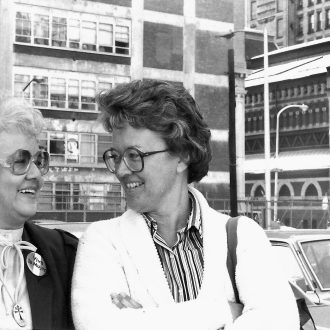By Blake Daniel, Duke Divinity Intern
I’m always struck by the drive out of Durham and into farm country.
Lauren and I meet up with Rebecca from the Southern Coalition for Social Justice, and the three of us make the trek to visit farmworker labor camps in rural North Carolina. We leave behind the gothic architecture of Duke University and the exposed brick of downtown Durham to, abruptly, find ourselves immersed in agriculture. As my fellow intern Lauren drives, I look out the window to see classic signs of Americana: red barns with Coke logos painted on the side, American flags flying in front of quaint farmhouses, “Jesus Saves” scrawled on makeshift marquees, and rusted-out Chevys, amongst other detritus, littering the shoulder, all of which seem to reach back into a bygone era. I take in the landscape glowing amber in the setting sun as we suddenly pull off the road and into a gravel parking area. A stray dog ambles by, a rooster crows, and I look up to see a single-wide trailer at the end of the driveway. We’ve reached the farmworker labor camp.
Although it’s not really a “camp,” this trailer serves as temporary housing for five Mexican workers for eight months out of the year. It has an addition off to one side – a cramped plywood room that’s no bigger than some walk-in closets I’ve seen – that is used as a bedroom for three of the workers. Walking up we are greeted by Josue, the eldest worker who seems to be the leader of the group. He welcomes us into the trailer and we sit on a small couch in the plywood room amongst four workers. Like last time, I try to discretely take in my surroundings without looking like a complete misfit. I notice the exposed bulbs overhead, the box fans perched on every windowsill, the single beds in each corner with clotheslines stretched overhead. I notice the workers themselves: deeply tanned and freshly showered, shirtless or wearing A-tees, resting on their respective beds. Their eyes dart between each of us and the TV flashing in the corner. I can tell they are doing the same thing I am: discretely sizing us up, trying to determine if we are friend or foe, how well we speak Spanish, how nice our clothes are. I think it’s a natural thing, this process of “sizing up” our surroundings. As a human I am, for better or worse, concerned primarily about my own wellbeing, just as these men are. New and different environments cause me to put my guard up, yet I remind myself I am guest in their home. Etiquette still applies, plywood room or not.
The visit goes much the same as last time: we briefly engage in chit-chat before jumping into more serious issues. We ask them about their wages and their quality of life – if they like their boss, if they have medical attention, if they have a phone – as well as their connection to the NC farmworker’s union. We also inform them of their rights as both farmworkers and human beings. The only difference with this evening is that we spent less time with Josue and his coworkers in order to visit two more labor camps before calling it a night.
The other two camps are different from Josue’s in that they are both houses, albeit houses that are old and spartan. Yet the camps have the same aura about them as Josue’s. As we drive up, I note the contrast between these camps and the other houses we passed in the surrounding area. Unlike nearby farmhouses, the worker houses we visit are not well-lit. There are no grills or rocking chairs on the front porch. There is no flag flying out front. They are not “homes” but exist solely to house an isolated group of men for seven or eight months out of the year.
I wonder about the concept of transient labor and whether it is good for the soul.
But, like last time, the workers are amiable and even cheerful. They welcome us into their houses and listen intently as we talk for a bit about immigration and union updates. As such, I feel a lot more comfortable this time around. Although our leader, Rebecca, does most of the speaking, I take a few opportunities to interject and dialogue with some of the workers in Spanish. It’s fun. But in gaining more confidence, I also notice a lot of the romance and novelty about visiting camps wearing off. As a result, I gain a greater sense of the pragmatic difficulty of the workers’ lives as well as the hardships of migrant workers as a collective whole.
I think about Josue on the drive home. I am stuck with the feeling that there is much work to be done.



